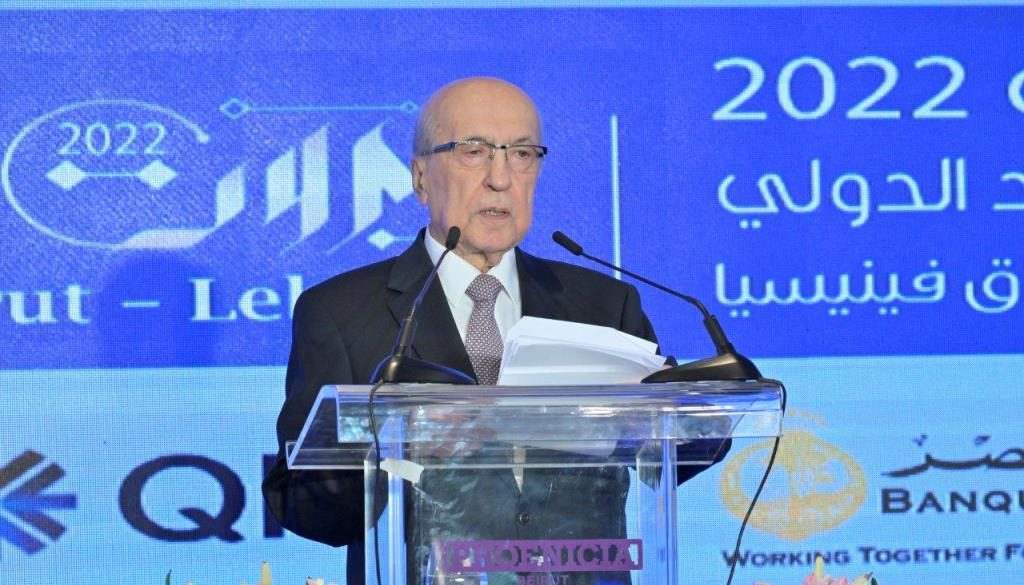As the Chairman of the World Union of Arab Bankers (WUAB) and Chairman of the Executive Committee at the Union of Arab Banks (UAB), I warmly welcome you all to this meeting organized by UAB. I especially extend my greetings to our Arab brothers who have gathered here today, as experts, speakers, and attendees. This forum will delve into the pressing issues in some Arab countries, particularly economic reforms and the role of the International Monetary Fund as a key factor for their success.
I would like to extend my gratitude, particularly to the Lebanese Prime Minister and President of the Council of Ministers, H.E. Mr. Najib Mikati, for sponsoring this forum and taking meticulous responsibility in this challenging time as Lebanon embarks on a recovery journey, working with international references such as the International Monetary Fund, the Lebanese parliamentary and economic stakeholders, civil society groups and multiple pressure groups and initiatives.
My gratitude is also extended to the experts who will share their experiences and insights from their respective countries during these days where the global economic crisis is affecting most of the world. The International Monetary Fund plays a pivotal role in support. In fact, the IMF contributed to mitigating the impacts of the global economic crisis in fiscal year 2022 by providing loans to struggling economies, including:
Approval of loans exceeding 219 billion dollars to 92 countries.
The IMF loan, along with the historical distribution of Special Drawing Rights (SDR) valued at 650 billion dollars, provided liquidity to countries facing a shortage of funds after the COVID-19 pandemic.
Special Drawing Rights were distributed to all member countries, including 275 billion dollars from the allocation of rising and declining economies.
These figures demonstrate the importance of the Fund in the world economy, ensuring countries’ economic stability and providing technical guidance to aid their access to other financial institutions and markets while implementing reforms.
In the Arab world, several Arab countries are negotiating with the International Monetary Fund to adopt economic reforms and obtain favorable loans to overcome financial difficulties and increase trust with the Fund. These countries include Egypt, Tunisia, Jordan, Sudan, and Lebanon. They are facing deep economic crises and require urgent financing along with monetary, fiscal, and tax reforms, restructuring of the public sector, and controlling inflation. The effects of the COVID-19 pandemic and the Russian-Ukrainian war have exacerbated the crisis in these Arab countries, making it more pressing to implement programs with the IMF. Currently, Lebanon is at the forefront of countries seeking to implement an IMF funding program along with economic reforms.
In reality, negotiating with the International Monetary Fund wasn’t easy, and now it will become more difficult due to Lebanon’s presidential void and the constitutional conflict over the continuation of the parliamentary council in legislation as it transitions into an electoral body limited to electing a republic president to complete the transfer of constitutional powers. Additionally, the issues being proposed by the parliamentary council for legislation, including untried measures such as freezing deposits, reducing bank interest rates, restricting interest movements, and conducting a tax system review, add to the complexity.
Seeking assistance from the International Monetary Fund was not a preferred option in Lebanon at any point, due to multiple considerations centered on caution regarding the Fund for various reasons. Until now, the financial collapse and Lebanon’s inability to pay its foreign sovereign debt and its exit from global financial markets made it impossible to return without an agreement with the IMF. Additionally, the difficulties faced by the IMF in Lebanon and its traditional or recent descriptions cannot be ignored, whether it was in terms of canceling banking secrecy, demanding the adoption of the Capital Control Law, unifying and freeing up exchange rates, controlling budget deficit, reducing deposits, restructuring banks, and reducing liabilities. Many parties in Lebanon doubt the validity of some of the harsh treatments and proposals included in the IMF plan. For example, some of the reforms required from the IMF are considered mandatory, and were expected to occur without IMF intervention, such as the Capital Control Law, necessary upon the onset of the crisis in 2020, tax system reform, expenditure restraint, reducing the size of the public sector, avoiding budget deficit, combating corruption, or freeing up exchange rates.
The Lebanese government has reached an initial agreement with the Fund at the level of employees, requiring most of the agreement items to be ratified by laws in the parliamentary council. This has happened so far regarding the amendment of the banking secrecy law and the issuance of the general budget law for 2022. What is being discussed today in the parliamentary council is the subject of capital control, which the Fund requires to be ratified. However, this is being approached with hesitation as it imposes restrictions on the transfer of capital in a country that relies on economic freedoms and, foremost, the freedom of movement of capital within its banking system.
The current parliamentary discussions reveal the existence of opposing views among the majority of parliamentary blocs regarding the bailout plan for defaulting deposits. Most parliamentary tendencies seem to favor protecting depositors’ funds, regardless of their size, including Arab banking institutions, investors and Arab depositors who have invested their funds for decades in Lebanese banks, as well as Lebanese depositors both resident and abroad. The Central Bank’s proposal to consider the state’s debt losses and its exemption from financial obligations towards the Central Bank and defaulting billions of dollars in debt will ultimately lead to the default of deposits, which is currently being rejected by the parliamentary majority. Many MPs are expressing completely opposing slogans, which are gaining support among depositor organizations of different affiliations, who have been called to “protect their deposits with a sacred duty.” However, it is not yet clear how these slogans will translate into action. Meanwhile, the Prime Minister, H.E. Mr. Najib Mikati, who put Lebanon on a reform path, is in line with the Fund’s demands and has informed the parliamentary majority of his efforts to address this gap in the bailout plan, which involves the default of deposits.
The International Monetary Fund must deal with the factual reality that there are constitutional, legal and political obstacles that prevent the state from seizing deposits. It must also not underestimate the economic and social effects of seizing deposits and its impact on recovery and restoring confidence in Lebanon and its banking sector, which is of concern to the Union of Arab Banks and other active Arab organizations in the investment field. Therefore, the Lebanese state must assume its responsibility for its debt and find a solution through a phased plan for returning deposits without selling its assets, and negotiate in good faith with Eurobond creditors to restore financial legality and return to international financial markets. Those who see no other way to eliminate debt other than through seizure reject, in reality, reforms to improve public finances, stop leakages, enhance revenues and put Lebanon on the path to recovery.
It is important to not overlook that a significant part of the crisis in Lebanon requires a political solution, not just an economic one. Therefore, it is necessary for constitutional institutions to return to work and for the election of a president of the republic, and for the parliamentary council to legislate, in order to reinforce the confidence of the international and Arab community in Lebanon and its institutions.
Confidence is also restored by listening to the recommendations of experts who will address the issue with knowledge and understanding. We will pay attention to the experiences of other Arab countries in managing their relationships with the International Monetary Fund, comparing the solutions adopted in each of those countries that precede Lebanon in economic reforms, which will facilitate Lebanon’s relationship with the International Monetary Fund and the achievement of desired reforms.
An agreement with the International Monetary Fund is necessary for Lebanon.
In summary, reaching an agreement with the IMF is critical for Lebanon’s return to international financial stability. This direction appears to be generally supported in Lebanon based on current discussions in the Lebanese parliamentary council. Laws will be enacted to safeguard higher Lebanese interests. The Union of Arab Banks supports this journey.
Thank you for listening.



